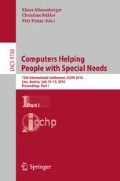Abstract
This paper presents the results of a qualitative study on elicitation and online detection of emotional states in users suffering from cerebral palsy (CP). Two questions stood in the focus of the study. Firstly, is an elicitation approach based on the international affective digitized sound system (IADS-2) database feasible for this user group? Secondly, is it possible to distinguish out of the measurements of the EDA sensor (Electro Dermal Activity) positive and negative emotional states? The results revealed high correlation between the findings in the study and the published IADS-2 standard [1]. These results has shown as well that it is possible to distinguish between positive and negative emotional states based on the measured EDA signals.
Access this chapter
Tax calculation will be finalised at checkout
Purchases are for personal use only
References
Bradley, M.M., Lang, P.J.: International affective digitized sounds (IADS): stimuli, instruction manual and affective ratings. The Center for Research in Psychophysiology, University of Florida, Gainesville, F.L. (1999)
Mohamad, Y., Hettich, D.T., Bolinger, E., Birbaumer, N., Rosenstiel, W., Bogdan, M., Matuz, T.: Detection and utilization of emotional state for disabled users. In: Miesenberger, K., Fels, D., Archambault, D., Peňáz, P., Zagler, W. (eds.) ICCHP 2014, Part I. LNCS, vol. 8547, pp. 248–255. Springer, Heidelberg (2014). doi:10.1007/978-3-319-08596-8_39
Mohamad, Y., Gappa, H., Nordbrock, G.: Experimental approach on affective aware systems for disabled users. Procedia Comput. Sci. 67, 445–451 (2015). doi:10.1016/j.procs.2015.11.085. ISSN: 1877-0509
Bradley, M.M., Lang, P.J.: Affective reactions to acoustic stimuli. Psychophysiology 37, 204–215 (2000)
Bradley, M.M., Codispoti, M., Sabatinelli, D., Lang, P.J.: Emotion and motivation I: defensive and appetitive reactions in picture processing. Emotion 1, 276–298 (2001)
Sander, K., Scheich, H.: Auditory perception of laughing and crying activates human amygdala regardless of attentional state. Cogn. Brain. Res. 12(2), 181–198 (2001)
Schirmer, A., Striano, T., Friederici, A.D.: Sex differences in the preattentive processing of vocal emotional expressions. NeuroReport 16, 635–639 (2005)
Bradley, M.M., Codispoti, M., Sabatinelli, D., Lang, P.J.: Emotion and motivation II: sex differences in picture processing. Emotion 1, 300–319 (2001)
Gohier, B., Senior, C., Brittain, P.J., Lounes, N., El-Hage, W., Law, V., Phillips, M.L., Surguladze, S.A.: Gender differences in the sensitivity to negative stimuli: cross-modal affective priming study. Eur. Psychiatry (2011). doi:10.1016/j.eurpsy.2011.06.007
Smith, N.K., Cacioppo, J.T., Larsen, J.T., Chartrand, T.L.: May i have your attention, please: electrocortical responses to positive and negative stimuli. Neuropsychologia 41(2), 171–183 (2003)
Acknowledgements
The study was partially funded by the European Commission EC FP7-ICT; 2011-7-287774; ABC Augmented BNCI communication. The authors would like to acknowledge the support of the project partners AVAPACE and IBV, both from Valencia, Spain.
Author information
Authors and Affiliations
Corresponding author
Editor information
Editors and Affiliations
Rights and permissions
Copyright information
© 2016 Springer International Publishing Switzerland
About this paper
Cite this paper
Mohamad, Y., Nordbrock, G., Gappa, H., Velasco, C. (2016). Study on Elicitation and Detection of Emotional States with Disabled Users. In: Miesenberger, K., Bühler, C., Penaz, P. (eds) Computers Helping People with Special Needs. ICCHP 2016. Lecture Notes in Computer Science(), vol 9758. Springer, Cham. https://doi.org/10.1007/978-3-319-41264-1_76
Download citation
DOI: https://doi.org/10.1007/978-3-319-41264-1_76
Published:
Publisher Name: Springer, Cham
Print ISBN: 978-3-319-41263-4
Online ISBN: 978-3-319-41264-1
eBook Packages: Computer ScienceComputer Science (R0)

